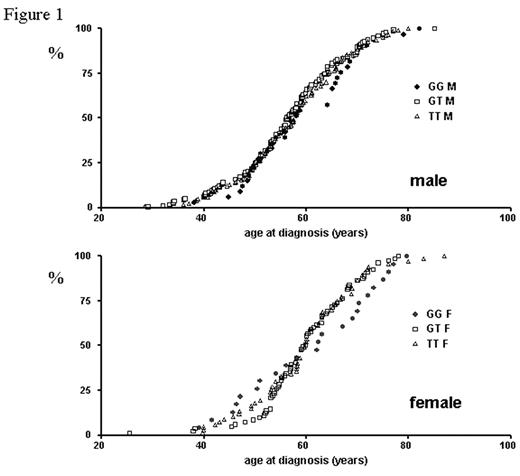Abstract
Background: A SNP in the MDM2 promotor region (SNP309) has been shown to directly influence MDM2 transcript and protein levels with the subsequent attenuation of the p53 pathway. In addition, the GG and GT genotype have been linked to earlier age of onset in patients with different cancers. Because of the well documented prognostic role of p53 in patients with CLL and the potential involvement of MDM2 particularly in patients with trisomy 12, we studied the MDM2 SNP309 in patients with CLL.
Methods: We developed a Denaturing High-Performance Liquid Chromatography (DHPLC) assay as a high-throughput approach to efficiently type this polymorphism.
Results: We analysed 627 CLL patients and found a similar genotype distribution as described for a large German control population (CLL: GG 12,75%; GT 48.8%; TT 38.4% vs. control: GG 14.4%; GT 44.1%; TT 41.8%). There was an equal genotype distribution among women and men. We compared the median age at diagnosis of the different genotype groups in CLL patients and did not find differences (female: GG 62.3; GT 59.8 TT 60; male: GG 58; GT 56.2; TT 58) (figure 1). However as a hormone dependent difference for pre- and postmenopausal female patients with cancer has been described, we separated the patients according to age and found a overrepresentation of the GG phenotype in young female CLL patients (<51 years) (25% GG vs 11% GG; p=0.04). In contrast, for older, female patients with the GG genotype there was a trend towards delayed onset of CLL (Figure1).
The overall survival among a subgroup of 483 patients was not influenced by the presence of a particular genotype (Median survival (months): GG 132.6; GT 134.1; TT 112.8). The mRNA expression levels of MDM2 and p53 were analysed by quantitative RT-PCR and correlated with the different genotypes.
Conclusion: The approach described can be used to rapidly type the MDM2-SNP309. Based on this study a role for the MDM2 polymorphism on disease predisposition of CLL is unlikely. The role of hormone dependent differences according to genotype in female patients warrants further investigation.
Disclosure: No relevant conflicts of interest to declare.
Author notes
Corresponding author


This feature is available to Subscribers Only
Sign In or Create an Account Close Modal